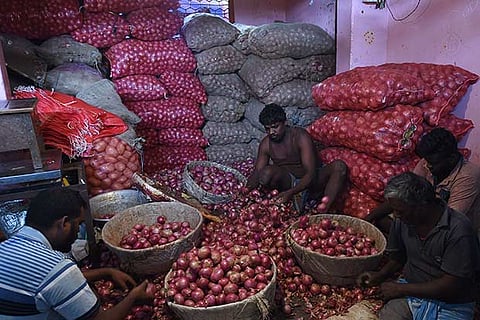

Chennai
Wholesale traders in the market blame the unprecedented price hike to a host of factors, including the vagaries of the weather. Earlier, the market used to receive 60 to 100 truckloads from Maharashtra, Andhra Pradesh, Karnataka and Telangana every day. But traders say they are now receiving only 20 truckloads that has made it difficult for them to maintain the margin. Due to this, claim vendors, they are forced to sell onions for double the price compared to the rate at which they purchase from the traders.
For the past two years, onion farmers have been supplying it to Chennai for Rs 25 per kg, which would be sold for Rs 30 – Rs 35 per kg. But in the last season, due to a shortage of the commodity, farmers are selling it for Rs 40 a kg – the rate goes up to Rs 50-Rs 55 per kg at Koyambedu wholesale market, and Rs 70 per kg when it reaches the retailers.
“We were able to manage till September. But since then, the supply has come down drastically. We are receiving only 20 truckloads a day from Karnataka and Nasik in Maharashtra from the usual 100. From last week, the supply onions from Karnataka have stopped and we are receiving only from Nasik,” said M John Valthari, secretary, Onion Merchants Association, Koyambedu Wholesale Market.
According to him, the price would further go up to Rs 200 per kg within a week. “The price will ease only from mid-January, he added.
From within Tamil Nadu, the market receives supply only from Tenkasi, which caters only about 10-15 per cent of the requirement. Every day, at least 15 truckloads are sent from Tenkasi, of which 5 trucks are sent to Chennai and the remaining to important markets like Madurai, Tiruchy and Coimbatore. “Of the loads we receive from Tamil Nadu, 50 per cent of the onions will be rotten. That is the reason why we get from other states,” said John.
“Only districts with alluvial soils will be able to grow this crop,” explained Ashok KR, director, Centre for Agricultural and Rural Development Studies, Tamil Nadu Agricultural University. Due to this, a small amount of Bellary onions is cultivated in Perambalur, Palladam, Tenkasi, and Ariyalur, and shallots in Dindigul, Perambalur, Ariyalur and Erode districts.
In Tamil Nadu, the cultivation period for the crop is only from June to August. Farmers said they faced huge losses this year due to water crisis. “We invested more than Rs 50,000 to grow onions, but the crop failed. Trading even one truckload was difficult in August,” said Padmanathan Muthuraj, a farmer at Sivagamipuram in Tenkasi. As the crop period is limited to the three months, farmers cultivate paddy during the rest of the period. “There was no rain in 2018. In June only 10 per cent of onions were grown. We faced huge loss this year by growing onions because the money spent on maintenance is more,” added Muthuraj.
For instance, he spends around Rs 20,000 – Rs 30,000/acre every year for maintenance. “If there is a shortage of organic fertilisers and water crisis, we will have to spend an extra Rs 20,000. This year, we spent Rs 50,000 – Rs 60,000 but it failed even after trying to cultivate three to four times. So we were able to supply only one truckload to Chennai and Coimbatore. Later, we started growing tomatoes and green chilies in July,” said Muthuraj.
Farmers said it is difficult to cultivate onions due to the climactic conditions in the State, where the monsoon is either heavy or scanty, both of which hits the crop. However, they are hopeful that the coming year would be better because of the rain that the State received this year.
D Narasimhan, retired botany professor said though the price has shot through the roof, the farmers here could not grow the crop because of unexpected rainfall in the districts where it is cultivated. “Another major reason (for the shortage) is many buying onions in large quantities and stocking in godowns. The State government should come up with a permanent solution to increase the area under onion cultivation,” ProfessorNarasimhan added.
Huge Shortfall
Visit news.dtnext.in to explore our interactive epaper!
Download the DT Next app for more exciting features!
Click here for iOS
Click here for Android